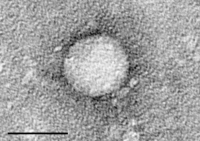
Photo from wikipedia
Purpose of Review Liver cancer is a major health burden globally with high rates in the Far East and Southeast Asia. Hepatitis B virus and hepatitis C virus remain the… Click to show full abstract
Purpose of Review Liver cancer is a major health burden globally with high rates in the Far East and Southeast Asia. Hepatitis B virus and hepatitis C virus remain the major causes of hepatocellular carcinoma (HCC) worldwide; however, the epidemiology is changing. Here, we review the changing epidemiological changes among Far East and Southeast Asians and among Asian Americans in the USA. Recent Findings HBV- and HCV-induced HCC is anticipated to decline in incidence. In contrast, nonalcoholic fatty liver disease-induced HCC will outrank viral hepatitis in the next decade. Alcoholic liver disease will remain a persistent risk factor for HCC. These epidemiological shifts might have implications for the care of patients with HCC as described in this review. Summary Societal changes are impacting the global incidence of HCC and will likely also impact the care of patients with this malignancy.
Journal Title: Current Oncology Reports
Year Published: 2022
Link to full text (if available)
Share on Social Media: Sign Up to like & get
recommendations!